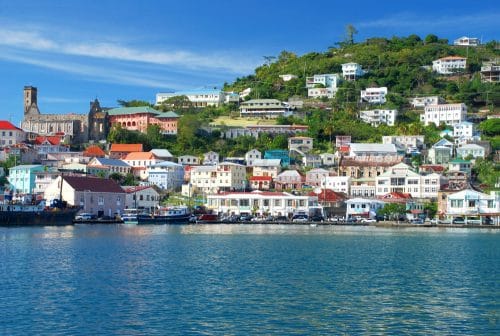Grenada Vaccines and Travel Advice

What vaccines are needed to travel to in Grenada 2021
The Government of Canada and the CDC recommend the following vaccines for travel to Grenada In 2025: Traveler’s diarrhea, Typhoid, Hepatitis A, Hepatitis B, Rabies, Influenza, COVID-19
The volcanic island nation of Grenada is a jewel lying in the Lesser Antilles. Mountains covered with lush forests, emerald-blue crater lakes, splendid waterfalls and countless idyllic white sand beaches give Grenada a Garden of Eden atmosphere. Away from mass tourism, Grenada is a genuine tropical paradise, with an omnipresent and mesmerizing nutmeg scent. Nutmeg trees thrive on Grenada’s fertile soils and the small country is one of the world’s largest exporter of nutmeg and mace. From the local market stalls to ice-creams, rum cocktails and traditional stews, the precious condiment is found absolutely everywhere on “the Island of Spice”.
HEALTH ADVICE TO TRAVEL IN GRENADA
Risk of Zika in Grenada Learn More >>
We make every effort to ensure that the information posted on our website is up to date and accurate according to the latest public health recommendations; however, it is impossible for us to make changes on a daily basis.
For the most current travel health recommendations, please call our clinic as make an appointment with one of our travel health professionals.
GRENADA – RECOMMENDED VACCINES
| Yellow Fever |
A proof of vaccination against yellow fever may be required upon entry in to this country. Some travellers may not be eligible to receive this vaccine. Please enquire with your health care professional regarding your specific details. For further information, please consult with the World Health Organization (WHO) website: |
| Hepatitis A | Recommended for all travelers. |
| Tetanus – Diphteria – Pertussis | Tetanus: In exceptional circumstances (eg, stay in a region where access to health care is limited), for a person aged 18 years or older, 1 dose of DT may be given if 5 years or more has elapsed since the last dose. Otherwise, one booster dose at the age of 50*. Pertussis (Whooping Cough): 1 dose is recommended for pregnant women, for every pregnancy, regardless of immunization history and the interval since the last dose (betwen week 26 and 32). *Only applicable for Quebec. |
| Measles – Rubella – Mumps | Two doses recommended for all travelers born after 1970, if not previously given. |
| Flu – Influenza | Seasonal influenza occurs worldwide. The flu season usually runs from November to April in the northern hemisphere, between April and October in the southern hemisphere and year round in the tropics. Influenza (flu) is caused by a virus spread from person to person through coughing and sneezing or by touching infected surfaces. Everyone 6 months and older should get a flu vaccine yearly. Vaccine is recommended 14 days prior to departure. |
| Routine vaccines (dCaT, Polio, Meningococcal, Shingles, Pneumococcal, Hepatitis B, HPV, MMR & Varicella) | Recommended for all travelers |
| Typhoid fever | Recommended for most travelers, especially those who are staying with friends or relatives; visiting smaller cities, villages, or rural areas where exposure might occur through food or water; or prone to “adventurous eating” |
| Hepatitis B | Consider for most travelers; recommended for those who might be exposed to blood or other body fluids, have sexual contact with the local population, or be exposed through medical treatment (e.g., for an accident). |
| Rabies | For travelers at high risk of animal bites or being involved in activities with bats, dogs and other mammals. Clients who plan to visit remote areas may consider receiving this vaccine. Important to note the pre-exposure rabies vaccine is administered in 2 doses with one week interval between doses. Post-exposure vaccination is always recommended, even for those previously vaccinated. |
| Traveler’s Diarrhea (ETEC) | Talk to your health care professional about the risks and precautionary measures to take, as well as the Dukoral® vaccine. Important to note that the Dukoral vaccine is an oral vaccine given in 2 doses, recommended at least 2 weeks prior to departure. |
| Dengue Fever, Chikungunya and/or Zika | There are many illnesses that are transmitted via mosquito bites and unfortunately we do not have vaccines to protect us against most of them. It is important to inquire with your healthcare professional regarding the specific risks and the different illnesses presently in circulation. |
RECOMMENDED MEDICATIONS FOR TRAVEL IN GRENADA
| Antibiotics Traveler’s Diarrhea | Ciprofloxacin, Azithromycin or Suprax. |
MEDICAL CARE IN GRANADA
The health care infrastructure is insufficient in Grenada. The country hosts a general hospital in St. Georges, the capital city, as well as small health care centers in Mirabeau and Carriacou. But these facilities are not able to take in charge many patients. Some private practices and clinics are found in Grenada, but the medical care they provide is not always of good quality. There is no decompression equipment in Grenada. In the event of a scuba diving accident, the victim needs to be evacuated to Martinique or Barbados. In case of serious injuries and diseases, an air evacuation to another country is required.
If you need an ambulance in Grenada, call 473 440 20 51.
Pharmacies are usually well stocked. But it is always safer to bring your own personal medical supplies.
ECURITY ABROAD
Petty crimes, such as thefts and purse-snatchings, occur and increase just before and during annual festivities, such as Carnival in August.
Emergency services
Dial 911 for emergency assistance.
